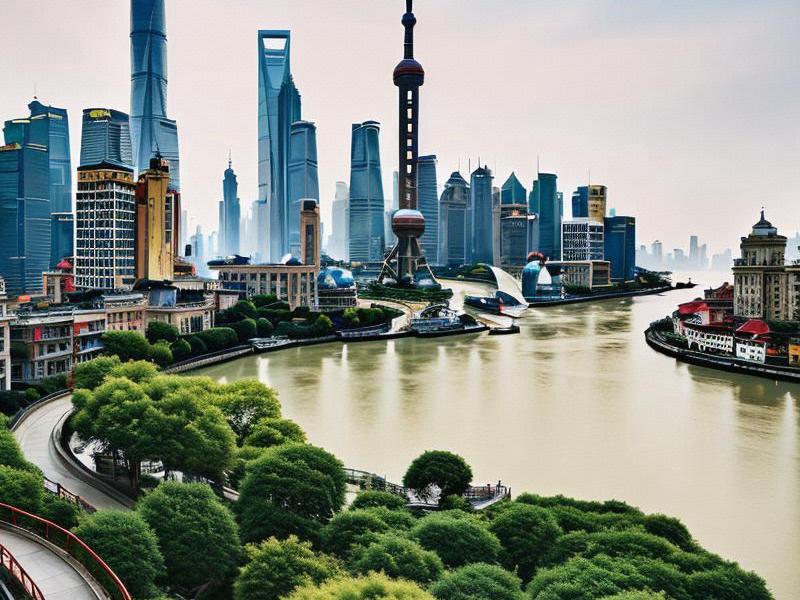
Shanghai, often referred to as the "Pearl of the Orient," stands as a beacon of modernity and progress in China. As the largest city in the country, Shanghai is not only a major economic powerhouse but also a cultural melting pot that attracts people from all over the world. However, the story of Shanghai is not just about the city itself; it is also about the surrounding areas that contribute to its growth and development.
The Yangtze River Delta region, which includes Shanghai, Suzhou, Wuxi, and other nearby cities, is one of the most economically developed and densely populated areas in China. This region has been a cradle of Chinese civilization for thousands of years, with a rich history and a strong tradition of commerce and trade. Today, it is home to some of the most advanced infrastructure, high-tech industries, and financial institutions in the country.
Suzhou, located just west of Shanghai, is renowned for its classical gardens, silk production, and ancient canals. Known as the "Venice of the East," Suzhou's beauty and charm have inspired poets and artists for centuries. The city has successfully blended its rich cultural heritage with modern urban development, making it a popular destination for both domestic and international tourists.
Wuxi, another neighboring city, is famous for its scenic Taihu Lake, which is one of the largest freshwater lakes in China. The area around Taihu Lake is known for its picturesque landscapes, traditional water towns, and delicious local cuisine. Wuxi has also emerged as a hub for high-tech industries and innovation, with numerous research institutions and technology parks located in the region.
爱上海论坛 Nanjing, the capital of Jiangsu Province, lies to the northwest of Shanghai and is steeped in history and culture. As one of the Four Great Ancient Capitals of China, Nanjing has witnessed the rise and fall of numerous dynasties. Today, it is a major cultural and educational center, with many prestigious universities and museums. The city's historic sites, such as the Sun Yat-sen Mausoleum and the Ming Xiaoling Mausoleum, attract millions of visitors each year.
Hangzhou, the capital of Zhejiang Province and home to the famous West Lake, is located to the south of Shanghai. Known for its natural beauty and cultural significance, Hangzhou has been a popular destination for poets, scholars, and travelers throughout history. The city's scenic spots, such as the Leifeng Pagoda and the Broken Bridge, are iconic symbols of Chinese culture. In recent years, Hangzhou has also become a major center for e-commerce and technology, with companies like Alibaba headquartered there.
The integration of these surrounding areas with Shanghai has created a synergistic effect that drives the overall development of the region. The Yangtze River Delta region is home to some of the most advanced transportation networks in China, including high-speed rail, highways, and seaports. This connectivity has facilitated the movement of goods, services, and people, fostering economic growth and regional cooperation.
上海花千坊爱上海 The economic development of Shanghai and its surrounding areas is characterized by a diverse range of industries. While Shanghai itself is known for its financial sector, international trade, and advanced manufacturing, the neighboring cities have their own unique strengths. Suzhou and Wuxi are major hubs for high-tech industries, including information technology, biotechnology, and clean energy. Nanjing and Hangzhou are prominent centers for education, culture, and e-commerce.
One of the key factors contributing to the success of this region is the strong emphasis on innovation and entrepreneurship. The Chinese government has implemented various policies and initiatives to support technological innovation and the growth of startups. This has led to the emergence of numerous innovative companies and research institutions in the Yangtze River Delta region, attracting talent and investment from around the world.
Culturally, the integration of Shanghai and its surrounding areas has created a rich tapestry of traditions and customs. Each city and region has its own unique cultural identity, which is reflected in its architecture, cuisine, arts, and festivals. For example, Suzhou's classical gardens are a UNESCO World Heritage Site, while Hangzhou's West Lake is celebrated for its beauty and historical significance. The region is also known for its traditional arts, such as silk weaving, calligraphy, and opera.
上海品茶网 The shared history and culture of Shanghai and its surrounding areas have fostered a sense of regional identity and pride. The people in this region are known for their entrepreneurial spirit, adaptability, and openness to new ideas. This has contributed to the region's success as a global hub for commerce, finance, and innovation.
However, the rapid development of Shanghai and its surrounding areas has also brought challenges and issues that need to be addressed. Urbanization, environmental concerns, and social inequality are some of the key challenges facing the region. The Chinese government and local authorities are working to address these issues through sustainable development practices, environmental protection measures, and social welfare programs.
In conclusion, Shanghai and its surrounding areas represent a dynamic and evolving region that plays a crucial role in China's national and global development. The integration of these cities and regions has created a powerful synergy that drives economic growth, cultural exchange, and innovation. As the region continues to grow and develop, it will undoubtedly remain a key player on the world stage.
The story of Shanghai and its surrounding areas is not just about economic success; it is also about the rich cultural heritage, innovative spirit, and shared identity that define this unique region. By exploring the cities and regions adjacent to Shanghai, we can gain a deeper understanding of the collective impact they have on China and the world.
